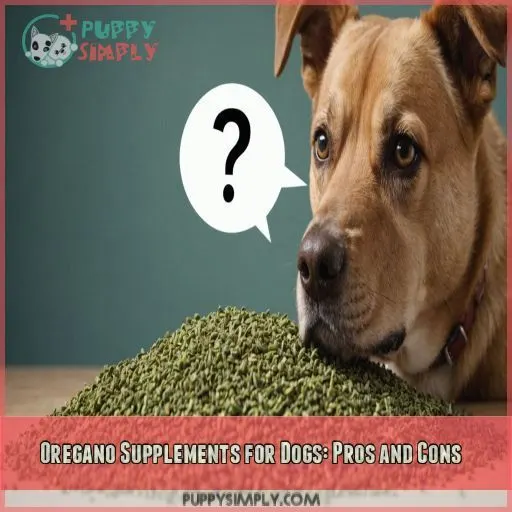This site is supported by our readers. We may earn a commission, at no cost to you, if you purchase through links.
 You’re thinking of adding oregano to your dog’s diet, but can dogs eat oregano safely?
You’re thinking of adding oregano to your dog’s diet, but can dogs eat oregano safely?
The answer is yes, in moderation.
Oregano offers potential health benefits like antioxidant properties and digestive aid, but large amounts can be toxic.
Start with a pinch of dried oregano (about 1/8 teaspoon) or 1-2 drops of diluted oregano oil per 10 pounds of body weight.
Mix it with food to avoid irritating their mouth and digestive tract.
Monitor for adverse reactions, and consult a vet before introducing oregano, especially if your dog has allergies or takes medication.
There’s more to explore for a healthy and happy pup!
Table Of Contents
- Key Takeaways
- Oregano: a Flavorful Herb for Dogs?
- Health Benefits of Oregano for Canines
- Risks of Feeding Oregano to Dogs
- Safe Dosage and Administration for Dogs
- Veterinary Perspectives on Oregano for Dogs
- Oregano Oil Vs. Dried Oregano for Dogs
- Alternatives to Oregano for Canine Health
- Homemade Dog Treats With Oregano
- Oregano Supplements for Dogs: Pros and Cons
- When to Consult a Vet About Oregano
- Frequently Asked Questions (FAQs)
- Conclusion
Key Takeaways
- You’re probably eager to share oregano with your furry friend, but remember to start with a tiny amount—a pinch of dried oregano or 1-2 drops of diluted oregano oil per 10 pounds of body weight—to avoid overwhelming their sensitive tummies.
- Oregano can be a great addition to your dog’s diet, offering antioxidant properties, digestive aid, and anti-inflammatory benefits, but always monitor for adverse reactions and consult your vet if you notice any unusual behavior or physical changes.
- Before giving your dog oregano, make sure to dilute the essential oil with a carrier oil; choose a mild option like coconut or olive oil, and measure carefully to avoid skin irritation or other adverse effects.
- If your dog has allergies, kidney or liver issues, or is taking medication, it’s best to steer clear of oregano or consult your vet for personalized advice to ensure their safety and well-being.
Oregano: a Flavorful Herb for Dogs?
Ever wondered if your furry friend can enjoy the zesty kick of oregano? You’re not alone! This Mediterranean herb isn’t just for pizza night anymore. While humans love its bold flavor, the question remains: is oregano safe for dogs?
Let’s spill the beans: oregano can be a tasty addition to your pup’s diet, but it’s not as simple as sprinkling it on their kibble. Like many herbs, oregano packs a punch in small doses. It’s important to understand the ins and outs before sharing this flavorful treat with your four-legged companion.
From oregano supplements to homemade treats, there’s a whole world of possibilities to explore. But hold your horses! Before you start whipping up oregano-infused goodies, let’s sniff out the facts. Is it a canine superfood or a potential hazard? Stick around as we uncover the truth about dogs and oregano.
Health Benefits of Oregano for Canines
You might be surprised to learn that oregano offers more than just a flavorful kick to your dog’s meals. This aromatic herb packs a punch with potential health benefits for your furry friend, from antioxidant properties to digestive support.
Antioxidant Properties
You’ve probably heard about antioxidants being good for humans.
Did you know they can benefit your pup too?
Oregano’s antioxidants are like tiny superheroes, fighting off those pesky free radicals that can cause oxidative stress.
This means a potential boost for your dog’s immune system and overall health.
It’s like giving your four-legged pal a shield against the villains of aging!
Antifungal and Antibacterial Effects
But that’s not all! Oregano’s superpowers extend beyond fighting free radicals. It’s like nature’s antibiotic for your furry friend. Here’s how oregano can be your pup’s secret weapon against pesky microbes:
- Tackles skin infections, keeping your dog’s coat healthy and itch-free
- Battles ear infections, potentially reducing vet visits
- Promotes dental health by fighting bacteria that cause bad breath
Digestive Aid and Stomach Soother
Ever noticed your pup’s tummy troubles? Oregano might be the answer! This herb isn’t just for pizza, it’s a natural digestive aid for your furry friend.
Like a soothing belly rub, oregano can calm an upset stomach and keep things moving smoothly. It’s like a probiotic alternative, supporting your dog’s gut health.
Just remember, moderation is key – too much of this herbal tea for dogs could turn into a stomach irritant!
Anti-inflammatory Benefits
But wait, there’s more! Oregano’s not just a tummy-tamer; it’s also a natural anti-inflammatory powerhouse for your furry friend. This means it could help your pup feel more comfortable and sprightly. Here are three ways oregano might fight inflammation in dogs:
- Reduces joint swelling
- Lowers inflammation markers in the blood
- Supports overall immune function
Potential Arthritis Relief
If your furry friend is battling arthritis, oregano might be a surprising ally in their corner. This humble herb packs a punch in the fight against inflammation, potentially easing your pup’s joint pain. But don’t go sprinkling it on their kibble just yet! Let’s break down the pros and cons:
| Potential Benefits | Considerations |
|---|---|
| Reduces inflammation | Consult your vet first |
| May ease joint pain | Start with small doses |
| Natural remedy | Monitor for side effects |
| Supports overall health | Not a cure-all |
| Antioxidant properties | May interact with meds |
In the fight against inflammation, oregano has some impressive credentials. But before adding it to your pup’s diet, consider the following points.
Risks of Feeding Oregano to Dogs
Now that you know the benefits of oregano for dogs, it’s essential to weigh the potential risks. Feeding oregano to your furry friend can be a double-edged sword. While it offers numerous health benefits, it can also cause harm if not used properly. You need to be aware of the risks associated with oregano toxicity, allergic reactions, and overdose.
- Oregano Toxicity Signs: Watch for vomiting, diarrhea, and lethargy, as these can be signs of oregano toxicity.
- Canine Allergic Reactions: Monitor your dog for signs of allergic reactions, such as itching, hives, and difficulty breathing.
- Thymol Poisoning Dangers: Be cautious of thymol, a compound in oregano that can be toxic to dogs in large amounts.
Always consult with your veterinarian before introducing oregano into your dog’s diet, and monitor for adverse effects. Remember, it’s always better to err on the side of caution regarding your furry friend’s health.
Safe Dosage and Administration for Dogs
You’re considering adding oregano to your dog’s diet, but you want to make sure you’re doing it safely and effectively. Here’s the lowdown on safe dosage and administration for dogs, so you can reap the benefits of oregano while minimizing the risks.
Recommended Amounts for Different Dog Sizes
When introducing oregano to your furry friend, it’s key to think about their size. For small breeds (under 20 pounds), start with a pinch of dried oregano (about 1/8 teaspoon) or 1-2 drops of diluted oregano oil per 10 pounds of body weight. For larger breeds, adjust accordingly, but always consult with your veterinarian for a customized dosage plan.
Dilution Methods for Oregano Oil
To safely use oregano oil for your dog, you’ll need to dilute it with a carrier oil. Choose a mild option like coconut or olive oil. Start with a small ratio, like 1-2% oregano oil concentration. Measure carefully, as canine sensitivity levels vary. For example, a 10-pound pup might need just 1/4 teaspoon of diluted oil per day.
Incorporating Oregano Into Dog Food
Now that you’ve got the right dilution, let’s talk about adding oregano to your dog’s food.
Start with a pinch of dried oregano or a small squirt of diluted oregano oil per 10 pounds of body weight.
Mix it with their meals to avoid irritating their mouth and digestive tract.
For homemade recipes, try pairing oregano with turmeric or rosemary for a tasty, healthy treat.
Monitoring for Adverse Reactions
Now that you’ve incorporated oregano into your dog’s food, monitor for adverse reactions.
Watch for vomiting, diarrhea, or lethargy within 24-48 hours.
If you notice any reaction warning signs, consult your vet.
Be aware of canine sensitivity levels and behavioral change indicators, as oregano can cause allergic responses.
Prioritize your dog’s safety, and don’t hesitate to seek dog treatment if needed.
Veterinary Perspectives on Oregano for Dogs
You’re probably wondering what your vet would say about giving oregano to your furry friend. Let’s get the lowdown from veterinary experts on the safety and potential benefits of oregano for dogs, as well as when to steer clear of it altogether.
Professional Opinions on Safety
Vets are pretty cautious about giving oregano to dogs. You want to make sure your pup stays safe and healthy. Here’s the lowdown:
- Talk to your vet: Before you even think about giving your dog oregano, chat with your vet about the risks and benefits.
- Keep an eye out for allergies: Watch your dog closely after giving them oregano. Are they acting weird or showing signs of an allergic reaction?
- Stick to the dosage: Follow your vet’s advice on how much oregano is safe for your dog. Too much can be bad news.
Recommendations for Use
When using oregano for your dog, start with a small amount – a pinch of dried oregano or a few drops of diluted oregano oil – and mix it with their food.
Always consult with your vet to make sure it’s safe and won’t cause problems with any medications they’re taking.
When to Avoid Oregano
When to Avoid Oregano (Veterinary Perspectives on Oregano for Dogs)
You should steer clear of oregano if your dog has allergies, is pregnant, or has kidney or liver issues. Existing conditions, like arthritis or digestive problems, may also be exacerbated by oregano. Always consult your vet before introducing oregano to your dog’s diet, especially if they’re already taking medication or have a compromised immune system.
Oregano Oil Vs. Dried Oregano for Dogs
If you’re thinking about giving your dog oregano, you’ve got two main options: oregano oil and dried oregano. But which one is safer and more effective for your furry friend, and how do you use them without putting your dog at risk?
Concentration Differences
If you’re thinking about using oregano for your dog, concentration is key.
Oregano oil is a really concentrated essential oil, so you need to dilute it carefully.
Dried oregano is a gentler option.
Don’t just assume a 1:1 ratio; start with a tiny amount of dried oregano or a diluted oregano oil (about 1-2% dilution ratio) so you don’t overwhelm your furry friend.
Safety Considerations
When using oregano for your dog, safety comes first. You want to avoid any adverse reactions, especially if your furry friend has allergies or sensitivities. Here are some key considerations:
- Start with small amounts: Introduce oregano in tiny doses to monitor your dog’s response.
- Watch for allergic reactions: Be on the lookout for signs of discomfort, itching, or digestive issues.
- Consult your vet: Get professional advice on the right dosage and administration for your dog’s breed and size.
- Dilute oregano oil: Always mix essential oils with a carrier oil to prevent skin irritation or other adverse effects.
Ease of Use
If you’re looking for the easiest way to use oregano, you have two choices: oregano oil and dried oregano. Here’s a quick rundown of the pros and cons of each:
| Option | Ease of Use |
|---|---|
| Oregano Oil | Convenient, but requires careful dilution to avoid overwhelming your dog’s senses. |
| Dried Oregano | Easy to sprinkle on food, but may lose potency over time if not stored properly. |
| Oregano Oil | Can be messy and difficult to measure accurately. |
| Dried Oregano | Simple to measure and mix with food, but may not be as potent as oil. |
Alternatives to Oregano for Canine Health
You’re considering alternatives to oregano for your furry friend’s health, and that’s a great idea – after all, it’s always good to have options when it comes to keeping your dog safe and healthy. Let’s explore some oregano alternatives that can provide similar benefits, from digestive aid to anti-inflammatory relief, without the potential risks associated with oregano.
Peppermint for Digestion
Peppermint is a great alternative to oregano for dogs, offering similar digestive benefits. Here’s how to use it safely:
1. Peppermint Oil vs. Leaves: Peppermint oil is highly concentrated and should be avoided. Fresh or dried peppermint leaves are safer, adding flavor and aiding digestion.
2. Dosage for Puppies: Start with a small amount, like a pinch of leaves, and increase gradually. Puppies have sensitive tummies, so introduce it slowly.
3. Peppermint for Gas: The menthol in peppermint can help relax the gut, reducing gas buildup and soothing discomfort.
4. Peppermint and Anxiety: Peppermint has a calming effect, helping anxious dogs find peace. It’s a natural way to ease their worries without strong medications.
Parsley for Fresh Breath
Parsley is more than just a garnish.
It’s a nutrient-rich herb that can work wonders for your dog’s breath.
Packed with vitamins and minerals, parsley is a natural breath freshener, banishing those doggy odors.
It also aids digestion, so it’s a win-win.
Think of it as a healthy, natural remedy to keep your pup’s breath kissably fresh!
Just remember to introduce it slowly and in small amounts to avoid tummy troubles.
Turmeric for Inflammation
Turmeric, a spice and close relative of ginger, is an effective anti-inflammatory for dogs. Here are some key insights about using turmeric for canine inflammation:
- Turmeric contains curcumin, a potent anti-inflammatory compound.
- It’s a natural alternative to NSAIDs for joint pain and arthritis, offering pain relief without the side effects.
- Consult a vet for the correct turmeric dosage, as too much can cause stomach upset.
- Turmeric may help dogs with allergies by reducing overall inflammation.
Rosemary for Antioxidants
Rosemary is another herb that offers similar benefits to oregano. Packed with antioxidants, rosemary for dogs is a safe and flavorful alternative. It improves digestion and freshens breath. Think of it as a multi-tasking mouthwash and tummy soother. Rosemary supplements are available, but always consult your vet for dosage and only use dog-specific products.
Thyme for Antibacterial Properties
Thyme is another herb that’s really good for dogs.
It has antibacterial properties similar to oregano, which can help fight off infections, especially skin infections.
Thyme is often used as a natural remedy for skin issues in dogs, making it a popular choice for itchy pups.
Think of it as nature’s medicine for those annoying skin problems.
Just be mindful of the dosage, as too much thyme can upset your dog’s tummy.
A pinch of dried thyme or a small amount of diluted thyme oil goes a long way.
Homemade Dog Treats With Oregano
You’ve learned the ins and outs of oregano for your furry friend, and now it’s time to whip up some tasty treats! We’ll explore homemade dog treats with oregano, offering fun and healthy options to spice up your dog’s snack time.
Pumpkin and Oregano Biscuits
You’re ready to try homemade dog treats with oregano! Start with a simple pumpkin biscuit recipe, mixing cooked pumpkin with whole wheat flour, oats, and a pinch of dried oregano. These tasty bites offer pumpkin oregano benefits, like soothing digestion and fighting infections. Just remember oregano biscuit safety: use dog-friendly amounts and monitor for adverse reactions.
Oregano-Infused Chicken Treats
When making oregano-infused chicken treats for your dog, remember to keep their safety top of mind. You want to make sure the treats are tasty and good for them. Here are three key things to think about:
- Use dog-friendly ingredients: Choose plain, boneless chicken and fresh oregano leaves.
- Watch the oregano amount: Only add a pinch of dried oregano or a few fresh leaves to avoid overwhelming your dog’s senses.
- Monitor for allergic reactions: Keep an eye on your dog’s behavior and digestive health after introducing the new treats.
Carrot and Oregano Chews
You’re looking for a tasty and healthy treat for your furry friend! Try making Carrot and Oregano Chews at home. This simple recipe combines the natural goodness of carrots with the antioxidant properties of oregano. Here’s a quick guide:
| Ingredient | Quantity |
|---|---|
| Carrots | 2 medium |
| Oregano | 1/4 teaspoon |
| Olive Oil | 1 tablespoon |
Mix, mash, and serve!
Oregano Supplements for Dogs: Pros and Cons
You’re considering oregano supplements for your furry friend, but you want to make sure you’re making the right choice. Let’s break down the pros and cons of oregano supplements for dogs, from available forms like capsules and oils to quality control and potential interactions with medications.
Available Forms (Capsules, Powders, Oils)
- Capsules: Convenient, but may not be easily digestible for all dogs.
- Powders: Can be mixed with food, but may lose potency over time.
- Oils: Highly concentrated, so use with caution to avoid overwhelming your dog’s system.
Quality Control and Third-Party Testing
When choosing oregano supplements for your dog, prioritize quality control and third-party testing.
Look for trusted brands that use independent labs to verify ingredients and make sure the quality is top-notch.
This helps guarantee the supplement is safe and effective.
Don’t compromise on your dog’s health – opt for transparent and reliable brands that put your furry friend’s well-being first.
Verify certifications and read reviews carefully.
Potential Interactions With Medications
When giving your dog oregano supplements, be careful of potential interactions with medications.
Talk to your vet to avoid any bad reactions.
Certain medications, like blood thinners, might clash with oregano’s compounds.
Your vet’s guidance helps keep your dog’s medications safe and minimizes oregano risks.
Make sure your dog’s health is top priority by talking to a professional about supplement concerns and drug interactions.
When to Consult a Vet About Oregano
You’re considering adding oregano to your dog’s diet, but you want to make sure you’re doing it safely – that’s where consulting with a vet comes in. If you notice any signs of allergic reactions, digestive disturbances, or changes in your dog’s behavior or energy levels after introducing oregano, it’s time to get professional advice.
Signs of Allergic Reactions
When introducing oregano to your dog’s diet, monitor for signs of allergic reactions. If you notice any unusual behavior or physical changes, consult your vet ASAP. Here are some red flags to watch out for:
- Skin irritation or itching
- Vomiting or diarrhea
- Swelling, especially around the face or paws
- Increased scratching or chewing
- Restlessness or lethargy
Digestive Disturbances
If your dog experiences digestive disturbances like stomach upset, diarrhea, or vomiting after consuming oregano, it’s time to consult a vet. Don’t wait – your dog’s health is at stake. Even if you’ve followed the recommended dosage, oregano can still cause issues in some dogs. Your vet will help you determine the best course of action.
Changes in Behavior or Energy Levels
If you notice changes in your dog’s behavior or energy levels after introducing oregano, consult a vet ASAP. Lethargy, hyperactivity, or appetite changes can be oregano side effects. Energy fluctuations may indicate an adverse reaction. Don’t wait – your vet will help you determine the best course of action to keep your furry friend safe and healthy.
Frequently Asked Questions (FAQs)
Can puppies safely consume oregano like adult dogs?
With puppies, you’ll want to be extra careful with oregano. Their tiny tummies are still developing, so talk to your vet before giving them oregano to make sure it’s safe and to avoid any problems.
Does oregano interact with common dog medications or vaccines?
You’re a master chef for your furry friend, but before adding oregano to their menu, consider potential interactions with medications or vaccines. Talk to your veterinarian to make sure the recipe is safe and healthy for your dog.
Can oregano be used to treat specific dog allergies?
You’re wondering if oregano can help with your dog’s allergies. While oregano has antimicrobial and anti-inflammatory properties, consult your vet before using it to treat allergies, as it may interact with other treatments or worsen symptoms.
How does oregano affect dogs with pre-existing kidney issues?
If your dog has pre-existing kidney issues, consult your vet before using oregano. Oregano’s antioxidant properties may help, but its potential to increase urine production could strain kidneys, making it important to monitor your dog’s response closely.
Is oregano safe for dogs with sensitive stomachs or IBS?
If your dog has a sensitive stomach or IBS, approach oregano with caution. Start with a tiny amount and monitor their reaction. Talk to your vet before adding oregano to their diet to make sure it won’t make things worse.
Conclusion
Can dogs eat oregano? The answer is yes, but in moderation.
Oregano can be a healthy addition to your dog’s diet.
It has antioxidant properties and can aid digestion.
However, it’s important to watch for any bad reactions.
Always talk to your vet before giving your dog oregano.
















